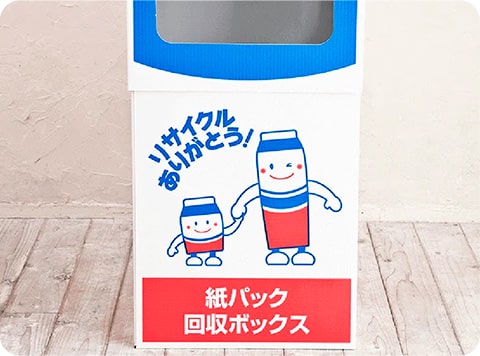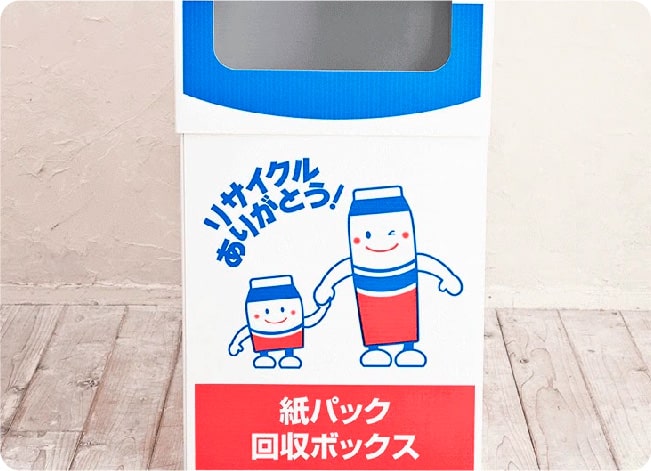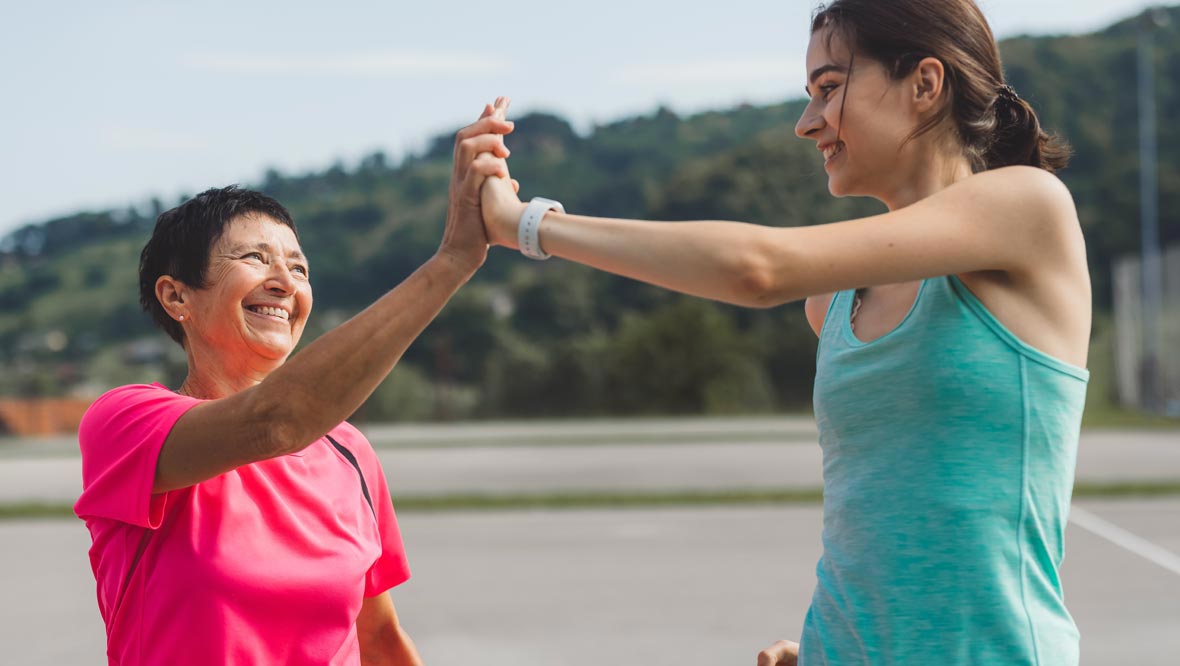
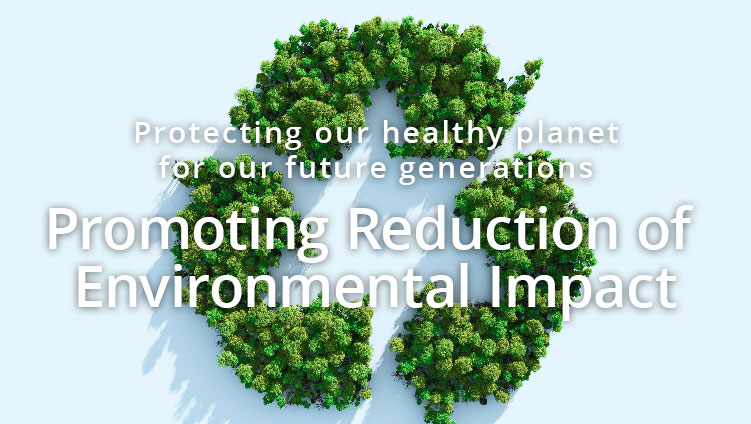
-
Keep People and the Earth Healthy.
To Realize a Sustainable Society,
Reduce Environmental Impact. -
In order to reduce environmental impact globally,
Meiji is promoting initiatives to reduce greenhouse gas emissions in the dairy industry, reduce food loss caused by best-before dates, and enhance the recycling of plastic resources.
As a provider of milk, which is a blessing of nature, we aim to realize a sustainable society where both people and the earth keep healthy.
The carbon footprint of products (CFP)1 calculation makes greenhouse gas (GHG) emission points visible.
Contributing to the SDGs

Aiming to reduce the impact of global warming in the dairy industry, we have started by identifying where and how much GHGs are being emitted. In FY2022, we conducted a CFP calculation for "Meiji Organic Milk" based on data collected from dairy farmers (milk production, milk composition, number of cows, type of feed, area under cultivation, amount of energy used such as electricity and light oil, etc.).2 We will promote specific initiatives for GHG reduction with producers.
The calculation and disclosure of greenhouse gas (GHG) emissions throughout the life cycle of products and services.
Calculated based on production at Meiji Asahikawa Plant in FY2021.
- Making Japan's Dairy Industry More Sustainable. Meiji Group Calculates Greenhouse Gas Emissions from Milk Production (Wellness Stories)
- Promotion of calculation of the carbon footprint of product(CFP)
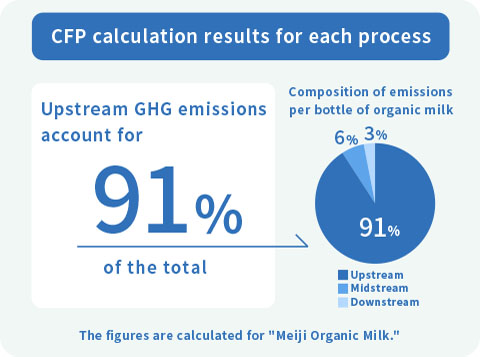
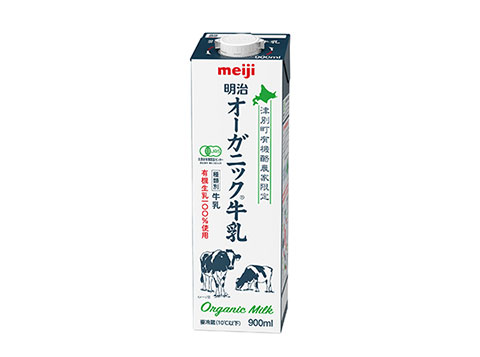
To reduce GHG in dairy farming, we aim to reduce GHG emissions from dairy cow manure and make it valuable.
Contributing to the SDGs


In March 2023, we collaborated with Ajinomoto Co., Inc. to create a business model to reduce nitrous oxide (N₂O) derived from manure produced during dairy farming.
Using an amino acid-balanced feed enables dairy cows to reduce N₂O from manure.
In addition, the GHG emissions reduced by the project can be converted into J-credits3 and sold, which will lead to new revenue source for dairy farmers. We will use these initiatives as an opportunity for expanding future collaborations and promoting GHG reductions in the milk value chain.
A national program for recognizing credits based on CO₂ emission reductions through the installation of energy-saving facilities and the adoption of renewable energy as well as CO₂ absorption achieved through appropriate forestry management.
- Innovative Feeding Strategies for Cows—A Joint Initiative for Dairy Industry Sustainability (Wellness Stories)
- Reduction of Scope 3 Emissions
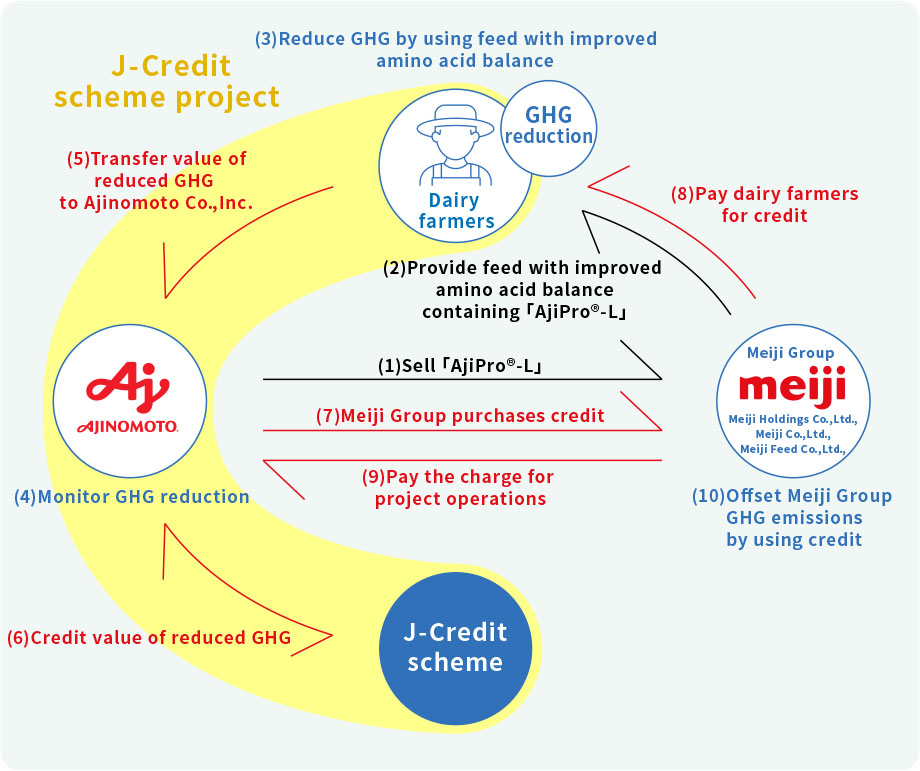
Promoted reduction of GHG emissions by utilizing the J-Credit system.
Contributing to the SDGs


The Meiji Group, in collaboration with Farmnote Dairy Platform Inc. (hereinafter, "Farmnote DP") and Marubeni Corporation (hereinafter, "Marubeni"), has reduced GHG emissions by utilizing Japan's first J-Credit system for dairy-derived products.
Farmnote DP has achieved a reduction of 149 tons of CO₂ per year since August 2022, by changing the management method of cow manure spread in fields from storage to a lower impact process called ‘forced fermentation.’4
Marubeni handles GHG emission calculations and J-Credit applications and sales, while Meiji Holdings purchases those J-Credits, creating an economic cycle within the dairy and livestock industry and working towards carbon neutrality.
A method in which dairy cow manure is forced to come into contact with air by agitation or other means to promote fermentation.
Farmnote DP reuses solids that have gone through this processing method as bedding (material used for bedding dairy cows).



Separated solids are forced fermented and used as bedding material

Forced fermented manure
Promoting GHG reduction through carbon farming.5
Contributing to the SDGs

In August 2023, the Meiji Group became a member of the "Doto Carbon Farming Study Group," which promotes carbon farming initiatives to reduce GHG emissions in the dairy industry.
The Doto Carbon Farming Study Group, in cooperation with dairy farmers, will promote initiatives aimed at evaluating, researching, and practicing "carbon farming" in Betsukai Town, the largest milk producer in Japan.
We will measure the actual CO₂ storage in the pasture from September 2023.
An agricultural method that aims to reduce GHG emissions by capturing atmospheric CO₂ into the soil and improving the quality of soil. In 2021, the European Commission announced the results of a two-year research study conducted from 2018 on the creation of a scheme to promote carbon farming, which has attracted attention as an activity to reduce GHG emissions reduction and absorption activities in the agriculture, forestry, and livestock industries.
-
To reduce food loss.
Extend the best-before date
for the Meiji Oishii brand.Contributing to the SDGs

In 2015, the Sustainable Development Goals (SDGs) adopted by the United Nations set a goal of halving food loss by 2030.
In April 2022, Meiji completed the extension of the best-before date of commercial products of “Meiji Oishii Gyunyu” to “19 days or more including the date of manufacture”.
We will promote efforts toward zero waste, including the reduction of food loss, for which interest is growing. -
Contributing to the SDGs

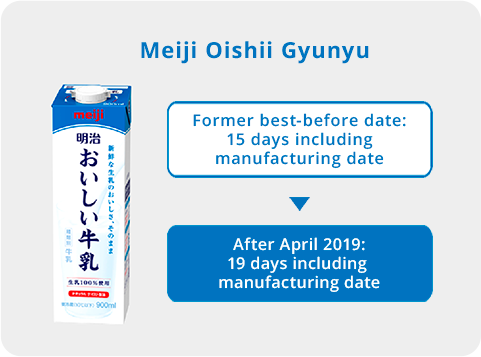
-
Toward strengthening plastic resource recycling.
Conversion of Meiji Oishii brand caps into biomass plastic.6Contributing to the SDGs

Meiji is working to strengthen plastic resource recycling. In July 2022. We began converting plastic used in caps and spouts for the Meiji Oishii brand into biomass material. As a result, we plan to reduce the use of raw materials derived from fossil resources by approximately 990 tons per year.
We aim to reduce CO₂ emissions from containers by approximately 10% for “ Meiji Oishii Gyunyu (900ml) " and approximately 15% for " Meiji Oishii Gyunyu (450ml) " compared with previous products.7Plastics derived from renewable organic resources such as plants. A new plastic material that is attracting attention because it help reduce CO₂ emissions without relying on fossil fuels as much as possible. We plan to gradually switch the cap and spout of these products with plant-derived materials (sugar cane).
CO₂ reduction rate has been certified by Carbon Trust.
-
Contributing to the SDGs

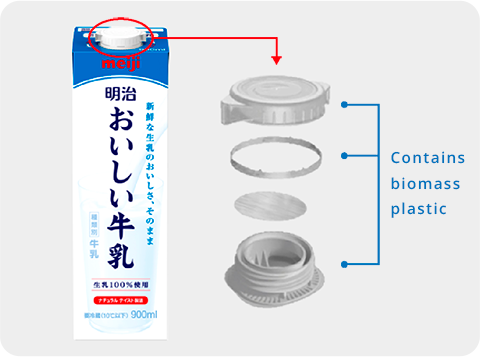
-
Raise and deepen awareness of environmental resources.
Many employees participate in the paper carton recycling campaign.Effective use of limited earth resources reduces the environmental impact.
Meiji conducts the "Paper Carton Recycling Campaign" twice a year to foster environmental awareness among employees.
Recycling paper cartons also helps protect forest resources. The purpose of this activity is to raise and deepen awareness of waste separation. -
